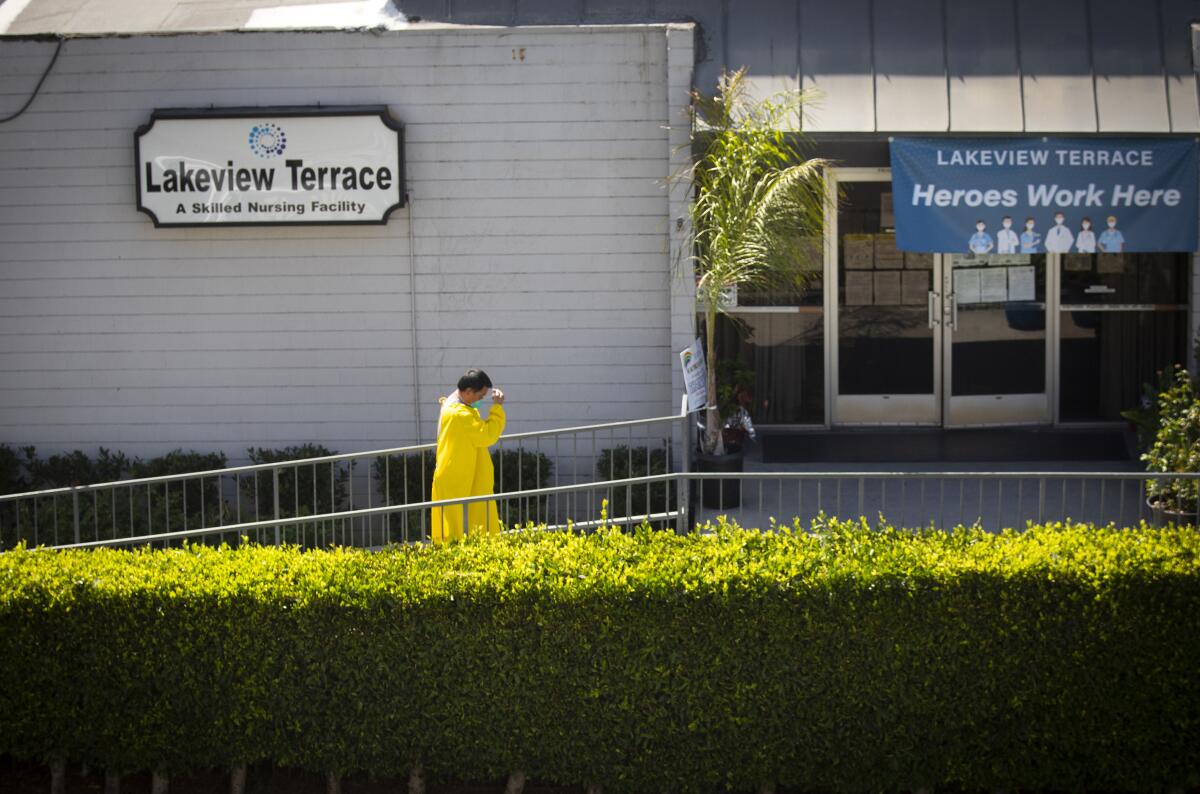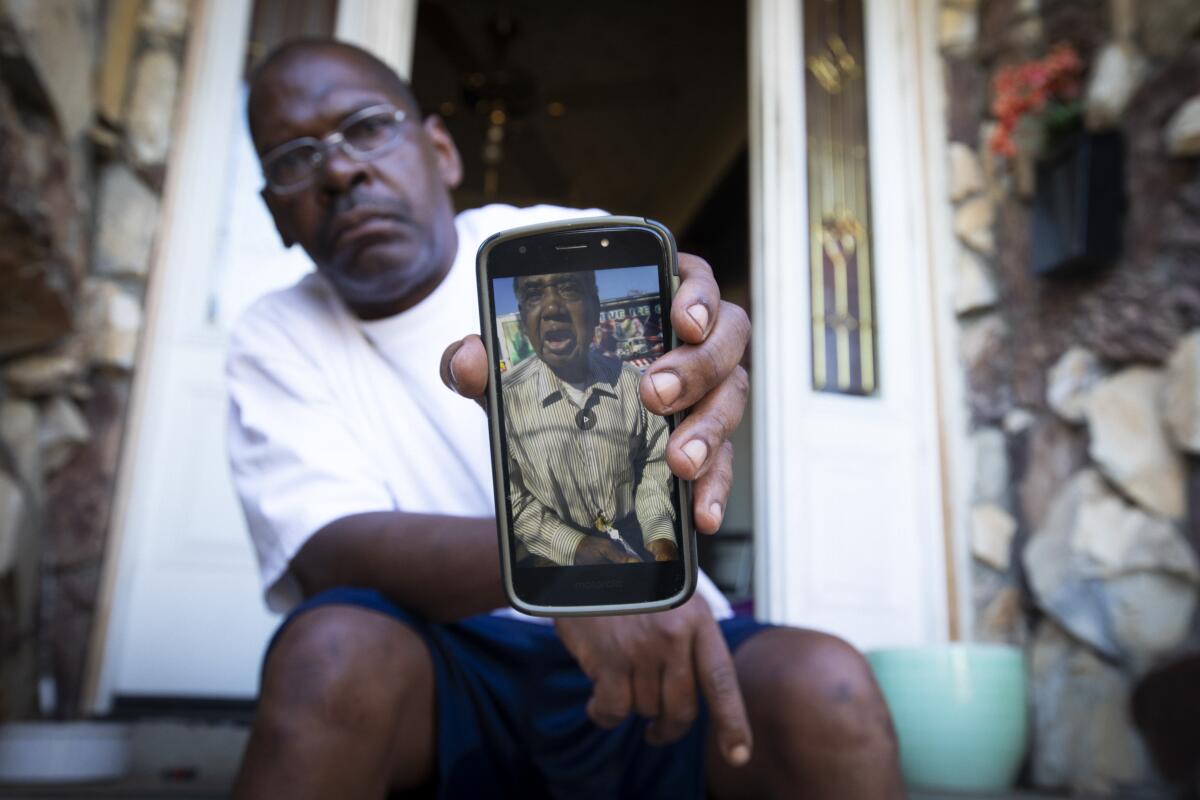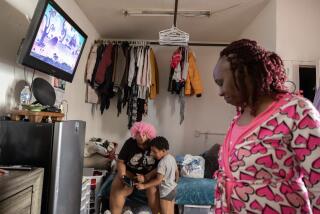City attorney accuses L.A. nursing home of dumping patients to profit from coronavirus

As the coronavirus continues its deadly march through Southern California nursing homes, the Lakeview Terrace skilled nursing facility in Los Angeles has been illegally “dumping” old and disabled residents onto the street and into homes that are not equipped to care for them, according to the city attorney.
Without notifying his family first, an 88-year old man with dementia was transferred from the Westlake nursing home to a boarding house in Van Nuys, only to be found wandering the streets profoundly confused a day later, according to a lawsuit filed in Superior Court in Los Angeles this week by City Atty. Mike Feuer.
Another resident with HIV who was dumped on the street instead of being provided the hospice care he needed wound up cowering in a friend’s backyard, hoping that would keep him safe from the pandemic, according to the complaint.
The “sustained” and “intentional” misconduct by Lakeview Terrace administrators comes at a time when nursing homes have an incentive to dump long-term residents, for whom they are paid little, to make room for COVID-19 patients, for whom they are paid much more, Feuer wrote in the lawsuit.
“This creates an incentive for nursing homes to seek out residents with higher rates of reimbursement and ‘churn’ residents by any means possible,” Feuer wrote.
The administrator of Lakeview Terrace, DJ Weaver, denied the allegations and wrote in an email to The Times that “we intend to vigorously fight [these] allegations in court. Due to patient privacy, we cannot address specific cases.”
Priority will now be given to those showing symptoms, who work in a high-risk environment or who have come in contact with a person known to have been exposed to the virus.
In May, The Times reported that nursing home experts had been warning for months that the federal government’s reimbursement method — which pays over four times more for COVID-19 patients than homes are able to charge for long-term residents with relatively mild health issues such as dementia — would lead to patient dumping by the industry’s unscrupulous actors.
Under Medicare’s new guidelines, which went into effect last fall, nursing homes are paid substantially more for new patients, especially in the first few weeks of their stay. So COVID-19 patients, particularly those recently released from a hospital, can bring in more than $800 per day, according to nursing home administrators and medical directors interviewed by The Times.
By contrast, facilities collect as little as $200 per day for long-term patients with dementia, the industry experts said.
Lakeview Terrace, a 99-bed facility, has had at least 54 confirmed cases of COVID-19 among residents and staff and at least eight deaths due to the disease, according to county health department records.
Yehuda Schmukler, who is listed as the primary owner of Lakeview Terrace by Medicare, said he is no longer affiliated with the home and declined to comment further. Another listed owner, Elliot Zemel, could not be reached for comment.
Schmukler is affiliated with two other Los Angeles County homes, according to Medicare records, which also have severe COVID-19 outbreaks: Granada Post Acute in Lynwood has at least 71 confirmed cases and 15 deaths, according to the county health department, and South Pasadena Care Center has at least 115 confirmed cases and 23 deaths.
The city attorney also accused Lakeview Terrace of failing to provide hundreds of doses of vital HIV and respiratory medications to patients and creating fake medical records to conceal the failure from regulators.
The home’s administrators also routinely covered-up cases of abuse, including an incident in which one resident attacked another with a “makeshift nunchuck weapon,” according to the complaint.
Such conduct would violate the settlement of a similar complaint filed last year by the city attorney against Lakeview Terrace, which was accused of patient dumping, failure to provide residents with necessary care, failure to protect their safety and failure to maintain accurate and complete medical records.
The home’s administrators agreed to pay $600,000 as part of that settlement, $150,000 of which would cover the cost of an independent monitor. The home appeared to cooperate at first, Feuer said in an interview, but after COVID-19 arrived all outside visitors were barred from the building, including the monitor. That’s when the situation deteriorated rapidly, Feuer said.
Now, the city is seeking financial penalties of more than $1 million and the appointment of a special master to oversee the home, Feuer said.
Lakeview Terrace, which has the lowest possible quality rating from Medicare, has a troubled history.
In November 2016, Lavell Murphy, a resident, died due to alleged “lack of care, abuse, willful neglect,” according to a lawsuit filed the next year.
Murphy was a paraplegic who had been in the facility since August. He developed bedsores that became infected and filled with maggots, leading to sepsis and death, according to the lawsuit, which was ultimately settled.
His daughter’s attorney declined to discuss the terms of the settlement because it was confidential.
“As for the complaint, the allegations speak for themselves,” Ellen Serbin said in an email. “In any event, the public record is replete with stories about Lakeview Terrace.”
In 2018, Marcie Rivers, a patient at the facility, suffered bruises and a deep cut to her head after a fall, according to a lawsuit filed that year accusing the home of negligent supervision.
As a result of the fall, Rivers needed several stitches and wound care, according to court documents.
“She was very lucky she didn’t crack her skull,” said Ben Yeroushalmi, who represented Rivers. “The fact that the injuries were not much higher was a miracle.”
The case ultimately settled.
“It’s just notorious for being a very bad facility and a serial violator of all kinds of regulations,” Yeroushalmi said. “You would think they’d get their act together and just improve. It’s just a matter of money.”
In both lawsuits, the home denied wrongdoing.
Daryl Kennedy, nephew of the 88-year old Lakeview Terrace resident with dementia, said he visited the home regularly and was appalled by the neglect his uncle and the other residents suffered at the home. “They treat them bad, man, pissing all over themselves, not changing their diapers, leaving them in their beds all wet,” Kennedy said.

His uncle, R.C. Kendrick, whose dementia drove him to wander the streets in a daze, sustained serious injuries after being hit by a car. He wound up at Lakeview Terrace following his discharge from the hospital because he needed more supervision than Kennedy could provide at home.
Kendrick was still wearing a cast on his leg and a neck brace when Lakeview Terrace administrators “transferred him in the middle of the night without my knowledge,” Kennedy said. He only found out about the transfer when the police called the next day.
Kendrick had wandered away from the boarding house he’d been transferred to and then fell trying to get off a bus, Kennedy said. When a stranger tried to help him, Kendrick attacked, thinking he was being robbed, Kennedy said.
With nowhere else to go, Kennedy said he brought his uncle home with him. But not long afterward, Kendrick attacked his nephew with a knife, causing injuries that required dozens of stitches and landing Kendrick in jail.
Wherever he winds up, Kennedy said, he hopes it’s somewhere secure.
“He walks away from everywhere he goes, and he can’t take care of himself,” Kennedy said. “I keep telling people, he has dementia.”
More to Read
Sign up for Essential California
The most important California stories and recommendations in your inbox every morning.
You may occasionally receive promotional content from the Los Angeles Times.













